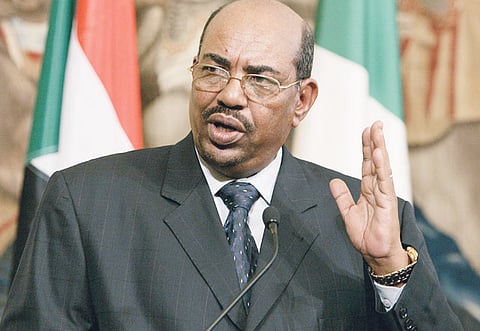Balkanisation strategy in Sudan
US and Europe would gain from an independent oil-rich south as they struggle to recover from recession and oil prices hover near $100 a barrel

Southern Sudan has come up with a new national anthem and a new flag. It designed a new currency several years ago, but debates are still raging over what the new country should be called.
There are various options being mooted, including the Nile Republic, Equatoria, Juwama, New Sudan and South Sudan. However, those details are the least of the new nation's worries.
The Sudanese President Omar Al Bashir under pressure from the United States has stated that he will respect the results of the south's referendum even though he will lose a third of his country and potentially 80 percent of its oil.
There is a suggestion that Washington has offered him a deal in exchange for a clean divorce with Juba that may include US sanctions being lifted against Khartoum, Sudan's removal from its list of terrorist states and debt relief.
It's also possible that the International Criminal Court in The Hague might be persuaded not to pursue its arrest warrant for Al Bashir for war crimes in Darfur.
But hours before the vote, the Sudanese leader warned that he would not accept oil-rich Abyei being subsumed into any new state. "If any party should take any independent action on Abyei that would be the beginning of a conflict" President Al Bashir told Al Jazeera.
That is why we say that the status quo in Abyei remains unchanged with the same administration and components until we reach a solution," he said.
Moreover, it's been reported that in the run-up to the referendum there were clashes between the Sudan People's Liberation Movement and militias supporting Khartoum as well as tribal violence against the police around Abyei resulting in 19 deaths.
Certainly, the Hollywood actor George Clooney who says he feels "like a skunk in the room" as he warns of a potential new civil war between north and south isn't celebrating yet.
As a founder member of a human rights project called "Not on our Watch", Clooney has funded the Satellite Sentinel Project that cooperates with Google, the United Nations and various anti-genocide organisations to use real-time satellite imagery for the purpose of monitoring troop relocations and mass population movements.
"We want to let potential perpetrators of genocide and other war crimes know that we're watching, the world is watching," he said.
While the mood in the West is overwhelmingly congratulatory, as long as oil is the elephant in the room I see the split as manufacturing a tinderbox that could erupt into a full-scale conflagration.
As far as I'm concerned, the break-away of the south as a mainly Christian entity is undesirable in that it sets a precedent that could affect other parts of Africa and the Middle East.
"The referendum in Sudan could have a domino effect," said the President of the Civil Rights Congress in Nigeria Shehu Sani. "It is likely to be an infection to other parts of Africa in the sense that most countries, particularly in the west, are divided along the lines of Christians and Muslims."
The balkanization of large countries has always been in the West's interest and still is. It's part of the old British ‘divide and rule' strategy that the former President of Ghana Kwame Nkrumah warned about in his book "Neo Colonialism – The last stage of Imperialism".
Nkrumah maintained that from the West's viewpoint, the most effective way of controlling natural resources was balkanization.
With oil approaching $ 100 a barrel when the US and Europe are struggling not to fall back into recession, they would benefit from a newly independent oil-rich south Sudan keen to leap into their sphere of influence.
Some analysts believe that the invasion of Iraq was a neo-conservative attempt to balkanize Iraq, which could still happen if that country descends into sectarian violence when the Americans pull-out.
It's worth mentioning that in 2006, then Secretary-of-State Condoleezza Rice talked about "a new Middle East" when Lieutenant-Colonel Ralph Peters prepared a map that was published in the Armed Forces Journal and has been used by Nato in a training program for senior officers.
That map shows Saudi Arabia split into an "Islamic Sacred State" and "Saudi Homelands Independent Territories", Iraq split into three and the West Bank as part of "Greater Jordan".
As long ago as 1982 an Israeli journalist Oded Yinon, who was attached to Israel's Ministry of Information, published a paper titled "A strategy for Israel in the nineteen-eighties". In this, he states:
"Breaking Egypt down territorially into distinct geographical regions is the political aim of Israel…If Egypt falls apart, countries like Libya, Sudan or even the more distant states will not continue to exist in their present form. The vision of a Christian Coptic State in Upper Egypt alongside a number of weak states with very localized power…is the key to a historical development…"
Yinon refers to Sudan as "the most torn apart state in the Arab Muslim world built upon four groups hostile to each other" and the Arab World as "a temporary house of cards put together by foreigners [Britain and France) without the wishes and desires of the inhabitants having been taken into account."
To avoid his words turning into a prophecy, Arabs need to see the big picture and ask whether the division of Sudan could be an omen for the future before the ghosts of Sykes and Picot who re-drew the Middle East in 1916 haunt this volatile region once again.
Linda S. Heard is a specialist writer on Middle East affairs. She can be contacted at lheard@gulfnews.com Some of the comments may be considered for publication.



